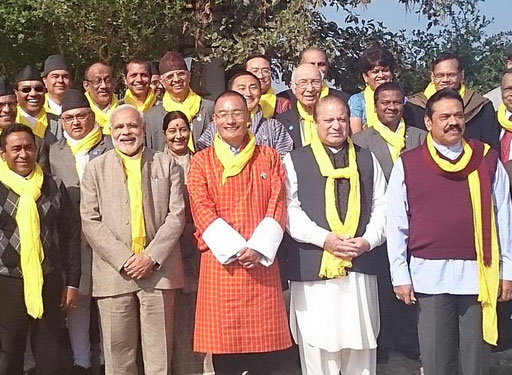
Modi, Sharif shake hands at SAARC retreat
According to TV reports, Modi and Nawaz Sharif shook hands and exchanged hellos during the retreat at Dhulikhel, an event that provides an informal setting for discussions over breakfast and lunch.
The development came after Nepali Prime Minister Sushil Koirala appealed the leaders of the two countries should hold talks with each other in an attempt to salvage the derailed summit.
But a planned meeting between two South Asian leaders has not taken place.
While the other heads of state and government of other member countries were flown to Dhulikhel in Kavre district near Kathmandu by Nepal Army helicopters, Modi flew in an Indian Air Force helicopter
The two heads of state turned cold shoulders to each other since the summit began on Wednesday.
Earlier, in his address in the opening session of the two-day summit, PM Modi had bluntly said SAARC evoked cynicism and skepticism, and offered his suggestions to improve connectivity in the region.
"As SAARC we have failed to move with the speed that our people expect and want. Nowhere in the world are collective efforts more urgent than in South Asia; and, nowhere else is it so modest," he said.
They did not even look at each other when they shared a dais in the opening session.
Modi took part in bilateral talks with every other SAARC nation except Pakistan on Wednesday.
Both sides stood firm saying it was up to the other to request a meeting.
The Kathmandu summit was to witness three agreements - on road connectivity, railways and a framework for energy cooperation - which some officials said were being held up by Pakistan.
But Pakistan blocked key proposals by India to integrate energy grids and free up road and rail movement forcing the cancellation of a signing ceremony.
Media reported that all eight Saarc leaders expressed frustration with the slow pace of progress towards greater regional integration, which new Afghan President Ashraf Ghani called a failure of political will.
It has been learnt that, to avoid such collapse, Koirala took the initiative to melt the ice.
Analysts dealing on International relations said that, with the cancellation of agreements, countries like Nepal and Afghanistan had to face huge problem at home since there wouldn't have been any development, trade within the SAARC nations.
Koirala rightly assessed that without agreement, India wont be able to involve themselves in Nepal in a larger way.
Trade between them has grown from under $140 million in 2008 to $878 million in 2012, but still accounts for less than five percent of the region`s total commerce.
Despite a free trade agreement signed in 2006, the right nations conduct barely 5 per cent of their total trade with each other.
In its 30-year history, the SAARC has delivered almost negligible results as far as economic ties and development among the eight members - Afghanistan, Bangladesh, Bhutan, India, the Maldives, Nepal, Pakistan and Sri Lanka - is concerned.
Analysts blame their rivalry and poor infrastructure for the very low levels of regional trade among the eight SAARC nations -- Afghanistan, Bangladesh, Bhutan, India, Nepal, the Maldives, Pakistan and Sri Lanka.
The two-day South Asian Association for Regional Cooperation Summit (SAARC) concludes on Thursday evening.
Support Our Journalism
We cannot do without you.. your contribution supports unbiased journalism
IBNS is not driven by any ism- not wokeism, not racism, not skewed secularism, not hyper right-wing or left liberal ideals, nor by any hardline religious beliefs or hyper nationalism. We want to serve you good old objective news, as they are. We do not judge or preach. We let people decide for themselves. We only try to present factual and well-sourced news.






